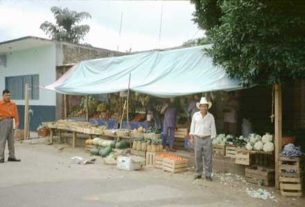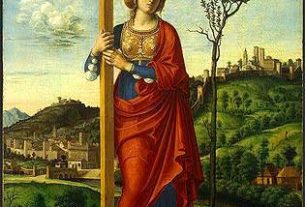An original short story set in Mexico
The other day Deovijilda Lara, who owns a tacos al vapor stand in a nearby pueblo Mercado Municipal, was regaling me with tales of her family’s Christmas last year. These mostly had to do with comically inappropriate gifts, the drunken, hilarious behavior of relatives and friends, punctuated, of course, with a few dark occurrences — a car accident, a cousin accidentally cutting off two fingers with a machete, an outdoor cooking fire consuming a year’s supply of valuable rastrojo (ground up corn cobs and stalks used for livestock feed). Most important, however was her success, after years of trying, in “finally” persuading her numerous offspring to give her gifts she really wanted and actually needed.
“In the name of Santa Rita de Casia (patroness of housewives), I told them, stop giving me plastic glasses, knives, pots and brooms.” She laughed, then called down the aisle of the Mercado to the puesto where several women were swiftly pressing out tortillas. “Oye, Concha, una docena for this hungry Señor.”
Though Deovijilda — whose name doesn’t come easily even to the Mexican tongue, and thus is called Lupe, the diminutive of Guadalupe, her husband’s name — is outspoken, she also possesses much of the wary manner of many countryside folk. In her 65 years, life’s rough-handed ways have taught her considerable caution.
As Lupe put a cup of hot atole in front of me, three unshaven young men stopped to ask what was for breakfast. Lupe’s menu is ample: Tacos of six kinds, as well as chilaquiles, pork in sauce, beef in sauce, chicken in sauce, nopales (trimmed, cooked cactus), rice, blanquillos al gusto (eggs any way you like), orange juice, te de manzanillo, cafe de olla, atole, and Coca-Cola.
The price of each dish was carefully explored. Finally, Lupe agreed to give them pork in sauce with frijoles and tortillas for two pesos less than usual.
When I asked in a low voice why she cut what was already a low price for her delicious food and hefty portions, Lupe merely frowned at me. She asked the men if they wanted Coca-Cola, a normal breakfast beverage here, and they nodded without haggling about price.
Then the jefa de cocina turned back and leaned across the cement counter. “Let me tell you, Señor, you never know in this business who you’re serving. Even a gringo like you can understand that, no?” Limited, but “outlandish” experience had indicated to her that gringos tended to be a bit dense.
“Every puestero here can tell you a story about that, Señor.” She cast up a plump hand to indicate the entire market, possibly the whole rational world — meaning the Mexican rural world.
“Pues, for example, Señor, since you don’t believe or even know what I’m talking about at all because you’re a foreigner whose mind is squeezed full of frivolous things, let me tell you exactly what I mean.”
Lupe stepped away to ask the three men if there was anything else they needed, then called for more tortillas.
“So then, about this early Christmas visit.” She tapped the dark counter between us. “The other day, a man stopped here for breakfast. He was a grown man, but at my age, he was a joven. In his thirties, maybe. He needed a haircut and had a couple week’s beard, the way men do around here. Very ordinary looking. Huaraches on his feet, a sarape on his shoulder. It was a chilly morning. He sat right over there.” She pointed to a metal Cerveza Corona table near the entrance to her puesto’s cement counter.
“He looked tired. He had traveled all the way from Ocotlán on the early bus. And before that on a milk truck from the ranchería where he said he lives. He came all the way over to collect a debt from…..” She mentioned a family locally notorious for their cut-throat business ways. “Pues, he didn’t get a single centavito, of course.
“So, pues, he hadn’t had anything to eat all morning and didn’t have a centavo. I believed him. He didn’t have the look of a liar. Pues, he asked if I would give him a little — a very little, he said — to eat. A few refried beans and a single spoonful of res en salsa.
“Bueno, I told him. He could pay me when he came back and collected his debt. He said he would do exactly that, and thanked me even before I served his plate.
“I began dishing up a normal helping, but he said no, just a little bit. I gave him more than that, but less than I usually do. It was Wednesday and I was muy sola that morning. Though later it picked up so much I could hardly handle all the clients.
“For a campesino, he was awfully well spoken. So polite. He mopped his plate with a last bit of tortilla, put his coffee cup in his dish and set them on the counter when he was finished. His table looked cleaner than when he sat down.
“My daughter Reyes, who is fierce about money, showed up as this joven thanked me for my ‘generosity,’ ‘May Dios pay you for your favor, Señora. And I will certainly pay for that fine breakfast.’
“Well, Reyes wanted to know who that stranger was. And what he was talking about. And where he was from. I love her, but she is a true metiche — a busybody.
“Pues, when Reyes found out I had given that man his breakfast for free, she ran right after him. ‘I’ll get your money, Mamá,” she said.’ He’d just left, shuffling along like any tired campesino does.
“But Reyes couldn’t find that man anywhere. He had disappeared, zaz, even though he had just left. He couldn’t have got any farther than the downstairs entrance steps, even if he’d been trotting right along. But not a soul had seen him. Reyes even went up and down the street looking for him and asking other marchantes he would have passed. Not a person saw him.”
Lupe shook her head and picked up my empty plate. “Reyes came back in a fit. ‘He ran off, and we’ll never see that one again,’ she said.”
Lupe set my plate down, lifted it up again and looked under it. “When I got around to collecting his plate and cup to wash them, you know what I found? One of those old-time silver pesos. Don Anselmo Vidaurri, who knows such things, says it’s worth a lot in Guadalajara. I didn’t mention it to anybody. Reyes would want to hide it someplace she’d forget. Alma would want to buy shoes with it. Andres would borrow it to get a new bridle and such for his horse, and Nacho would want to buy something for his pickup.
“Reyes kept harping. ‘That slick guy pulled a fast one on us, Mamá.’ Finally, I said, Who do you think that was, daughter? Well, Reyes didn’t know what I was talking about at first.” Lupe squinted at the three men who were mopping up their plates with tortillas and more or less belching in unison. “It was a Christmas visit, I told her.”
“‘Mamá,’ she said. ‘Do you know what you’re saying? You know that’s blasphemy. All these new curas these days are always saying that the things that happened all the time before and every place in the Bible can’t happen anymore. They say people make up stories and that it’s blasphemy.’
“Well, I asked Reyes, who was he, then, and where did he go?
“‘He’s just some slick campesino who cheated you out of a breakfast, Mamá.’
“Tired, centavo-less campesinos just don’t vanish in air.”
I smiled at Lupe, closing one eye, hopefully indicating both patience and friendly doubt. “Do you really believe….”
“Dios mío,” Lupe giggled, something she never does. “If it wasn’t Him, who was it then? To have disappeared into air like that? Just gone, without anyone seeing him? To have left that old coin? Just before Christmas?”
Staring into my cup, I considered what Lupe was saying. “Well, what was He doing here? Just checking up on you?”
Lupe nodded emphatically. “Pos, sí. It was a test.”
The three men slid off the other end of the long bench where I sat and paid Lupe, thanked her.
“And who are they?” I grinned. “The Three Wise Men?”
“Why not? Maybe three of the apostles.” she said. “Who knows? Do you?”
It was plain to both of us that in her context I certainly did not know. If her own Mass-going daughter couldn’t understand it, clearly I wasn’t going to figure it out.”
“You wouldn’t know about these things, probably,” Lupe told me as she collected the plates from the other end of the counter.
“Any silver coins?” I asked.
Lupe looked at me sternly. “You come from a wealthy country, Señor, filled with many toys. There is probably not so many things for Dios to do up there. But here, we need His help badly.”
First published in the Guadalajara Reporter in 1995.



